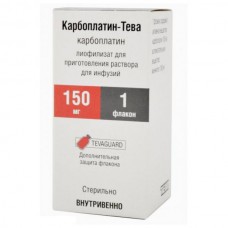Expiration date: 03/2026
Form release
Lyophilized powder for solution preparation for I / V administration
Composition
1 vial contains carboplatin 150 or 450 mg, excipients: mannitol
Packaging
1 vial
Pharmacological action
Carboplatin is an inorganic complex compound containing a heavy metal-platinum. It is assumed that the main mechanism of action of this drug is due to DNA binding, resulting in the formation of mainly intra-spiral cross-linking, which alter the structure of DNA and suppress its synthesis. This effect is manifested regardless of the phase of the cell cycle. Hydration of carboplatin, which results in the formation of the active form (form) of the drug, is slower than the hydration of cisplatin.
Indications
Ovarian cancer, germinogenic testicular and ovarian tumors, seminoma, malignant melanoma, head and neck tumors, lung cancer, cervical and body cancer, bladder cancer, osteogenic sarcoma.
Contraindications
Severe renal impairment, prior severe myelodepression, recent significant blood loss, hypersensitivity to drugs containing platinum.
Use during pregnancy and breast-feeding
Carboplatin-TEVA is contraindicated in pregnancy. If necessary, use during lactation should stop breastfeeding. Women of childbearing age receiving carboplatin therapy should use reliable contraceptive measures. In experimental studies found that carboplatin has teratogenic and embryotoxic effects.
Dosage and administration
Carboplatin-TEVA is administered in/in, the dose is selected individually, adjusted based on the clinical effect, the severity of the toxic effect. In / in the form of infusion, for 15-60 minutes, according to one of the schemes: 1) 300-400 mg/m2 1 every 4 weeks, 2) 100 mg/m2 daily for 5 days with a repeat of the course every 4-5 weeks, 3) 150 mg/m2 once a week for 4 weeks, then a break — 6 weeks. The total dose can also be calculated by the formula: planned AUC x (glomerular filtration rate + 25). With previous treatment with myelosuppressive drugs, in patients with initial hypofunction of bone marrow hematopoiesis, the General severe state of the dose is reduced by 20-25%. In violation of renal function (CL creatinine <, , 60 250="" 2="" cl="" 41-59="" 200="" 16-40="" 1="" 24="" :="" 1200-2100="" p=">",
Side effect
From the hematopoietic system: the Main toxic factor limiting the dose of carboplatin is the suppression of the function of bone marrow hematopoiesis. Myelosuppression is dose-dependent. The lowest possible level of platelets and leukocytes/granulocytes, usually achieved two to three weeks after the start of the drug, with thrombocytopenia occurs more often. Adequate recovery to a level that allows the next dose of carboplatin, usually takes at least four weeks. A sufficiently large number of patients may also show symptoms of anemia (hemoglobin level less than 11 g/DL), the intensity of which depends on the total dose. There may be a need for transfusion therapy, especially in patients undergoing long-term treatment (for example, more than 6 cycles of drug administration). There is also the possibility of clinical complications such as fever, infectious diseases, sepsis/septic shock and bleeding.
From the gastrointestinal tract: within 6 to 12 hours after taking the drug, there is a possibility of nausea and/or vomiting (from mild .moderate) lasting up to 24 hours or longer. The risk of vomiting effects can be reduced by pre-treatment with antiemetic agents, continuous in/in carboplatin infusion for 24 hours or fractional dose for 5 consecutive days. Also, in some cases, there were other types of undesirable effects on the gastrointestinal tract, such as inflammation of the oral mucosa, diarrhea, constipation and abdominal pain.
From the CNS and peripheral nervous system: there Is a possibility of peripheral neuropathies, mainly in the form of paresthesia and reduction of deep tendon reflexes, which is more likely in patients older than 65 years with prolonged or prior treatment with cisplatin. It is also possible symptoms of dysfunction of the Central nervous system. Prolonged therapy with the drug can lead to cumulative neurotoxicity.
From the hearing: ototoxicity is manifested in the form of tinnitus and hearing impairment.
On the part of the organs of vision: there is a possibility of temporary deterioration or complete loss of vision (possible loss of the ability to distinguish colors and see light), as well as other visual impairment. Improvement and / or complete restoration of vision, usually occurs within a few weeks after discontinuation of the drug. Patients with impaired renal function, treated with high doses of carboplatin, observed cortical blindness.
From the kidneys: there may be a slight and temporary increase in serum creatinine and urea concentrations. Acute kidney damage was rare. The risk of nephrotoxicity in patients receiving carboplatin (reduced creatinine clearance) increases with increasing doses of carboplatin, as well as in patients who have previously been treated with cisplatin.
Liver: there may be a slight and usually temporary increase in serum concentrations of ACT, bilirubin and alkaline phosphatase. Patients treated with high doses of carboplatin with autologous bone marrow transplantation had significant liver dysfunction.
Electrolyte balance May include hypokalemia, hypocalcemia, hyponatremia, and/or hypomagnesemia.
Allergic reactions: erythematous rash, fever, itching, urticaria, bronchospasm, hypotension and anaphylactic reactions. These reactions may occur within a few minutes after the introduction of carboplatin. In rare cases, exfoliative dermatitis may also be observed.
Other side effects: alopecia, asthenia, flu-like symptoms, hemolytic uremic syndrome, myalgia/arthralgia, heart failure, cerebrovascular disorders and allergic reactions directly at the site of administration of the drug.
Special instruction
With caution, Carboplatin-TEVA is used in patients with chickenpox (including recently ill or after contact with patients), with herpes zoster, other acute infectious diseases, in patients with hearing impairment, with ascites or exudative pleurisy.
Drug interaction
The use of carboplatin in combination with other myelosuppressive drugs or radiation therapy may increase the risk of hematological toxicity. The use of carboplatin in combination with aminoglycosides, as well as with other nephrotoxic drugs increases the risk of nephrotoxic and/or ototoxic effects.
Overdose
There are no special antidotes used in case of carboplatin overdose. In case of overdose, more pronounced side effects should be expected. Treatment is symptomatic. In the first 3 hours after administration of the drug may use hemodialysis.
Storage conditions
At room temperature not higher than +15-25° C.
Shelf life
4 years.



